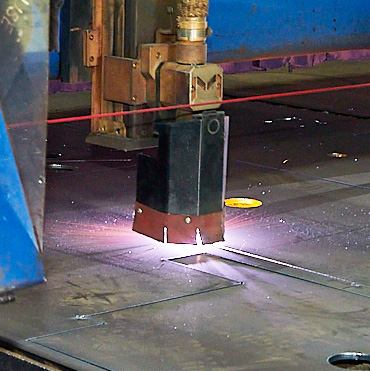
We collect basic website visitor information on this website and store it in cookies. We also utilize Google Analytics to track page view information to assist us in improving our website.

At Amber Steel, our dedication to sustainability drives every aspect of our operations. We recognize the responsibility we hold towards our planet and future generations. Our focus on sustainability extends from our core values to our everyday practices. We firmly believe in the importance of responsible resource management, and this belief is reflected in our cutting and manufacturing processes for steel.
In our pursuit of sustainability, we adhere to a principle of utilizing resources wisely, leaving no room for waste. When it comes to cutting and manufacturing steel, we ensure that every piece is utilized to its fullest potential. Rather than discarding any component, we actively repurpose materials, ensuring that they contribute to new creations or applications. This commitment not only minimizes waste but also conserves valuable resources.
By adopting these practices, we contribute to a reduction in pollution and a conservation of energy. Our sustainability efforts ripple through the production cycle, fostering a more environmentally friendly approach to steel manufacturing. Customers who choose Amber Steel are aligning themselves with a partner who shares their environmental consciousness. We take pride in offering solutions that not only meet their needs but also resonate with their values. With Amber Steel, sustainability isn't just a promise – it's a commitment that drives our choices and defines our legacy.
A zero-waste approach provides a multitude of benefits that extend beyond environmental responsibility. As a manufacturing company, we make it a priority to significantly reduce our waste output. Here’s why:
 Environmental Preservation: Reducing waste minimizes the impact on ecosystems, conserves resources, and helps mitigate pollution, contributing to a healthier planet.
Environmental Preservation: Reducing waste minimizes the impact on ecosystems, conserves resources, and helps mitigate pollution, contributing to a healthier planet.
 Cost Savings: Efficient resource usage means reduced material purchase and disposal costs, translating into substantial financial savings for our company.
Cost Savings: Efficient resource usage means reduced material purchase and disposal costs, translating into substantial financial savings for our company.
 Energy Conservation: Waste reduction often leads to decreased energy consumption during manufacturing processes, contributing to a lower carbon footprint.
Energy Conservation: Waste reduction often leads to decreased energy consumption during manufacturing processes, contributing to a lower carbon footprint.
 Regulatory Compliance: A zero waste approach often aligns with regulatory standards and waste management regulations, ensuring legal compliance.
Regulatory Compliance: A zero waste approach often aligns with regulatory standards and waste management regulations, ensuring legal compliance.
 Enhanced Reputation: Demonstrating commitment to environmental stewardship enhances the company's reputation, appealing to environmentally-conscious customers and partners.
Enhanced Reputation: Demonstrating commitment to environmental stewardship enhances the company's reputation, appealing to environmentally-conscious customers and partners.
 Innovation: The pursuit of zero waste often drives innovative solutions and process improvements, fostering a culture of continuous improvement.
Innovation: The pursuit of zero waste often drives innovative solutions and process improvements, fostering a culture of continuous improvement.
 Institutional Investor Appeal: Companies focused on sustainability are often more attractive to environmentally-conscious investors, expanding potential funding opportunities.
Institutional Investor Appeal: Companies focused on sustainability are often more attractive to environmentally-conscious investors, expanding potential funding opportunities.
 Resource Efficiency: Maximizing the use of raw materials reduces the need for extraction and processing, conserving valuable natural resources.
Resource Efficiency: Maximizing the use of raw materials reduces the need for extraction and processing, conserving valuable natural resources.
 Employee Morale: A commitment to sustainable practices can boost employee morale, as staff members are more likely to feel proud of working for an environmentally responsible company.
Employee Morale: A commitment to sustainable practices can boost employee morale, as staff members are more likely to feel proud of working for an environmentally responsible company.
 Long-Term Viability: By adopting a zero-waste approach, manufacturers future-proof their operations, ensuring sustainability and resilience in a resource-constrained world.
Long-Term Viability: By adopting a zero-waste approach, manufacturers future-proof their operations, ensuring sustainability and resilience in a resource-constrained world.
 Competitive Advantage: Companies with a zero-waste focus stand out in the market as forward-thinking and responsible, gaining a competitive edge.
Competitive Advantage: Companies with a zero-waste focus stand out in the market as forward-thinking and responsible, gaining a competitive edge.
 Community Engagement: Active participation in waste reduction initiatives can foster positive community relationships and support.
Community Engagement: Active participation in waste reduction initiatives can foster positive community relationships and support.
 Circular Economy Contribution: Embracing a zero-waste approach aligns with the principles of a circular economy, where materials are kept in use for longer periods.
Circular Economy Contribution: Embracing a zero-waste approach aligns with the principles of a circular economy, where materials are kept in use for longer periods.
 Supply Chain Optimization: Collaborating with suppliers who share the zero-waste philosophy can lead to a more efficient and sustainable supply chain.
Supply Chain Optimization: Collaborating with suppliers who share the zero-waste philosophy can lead to a more efficient and sustainable supply chain.
 Risk Mitigation:
Risk Mitigation:
Waste reduction can minimize potential liabilities associated with waste disposal, spillages, or accidents.